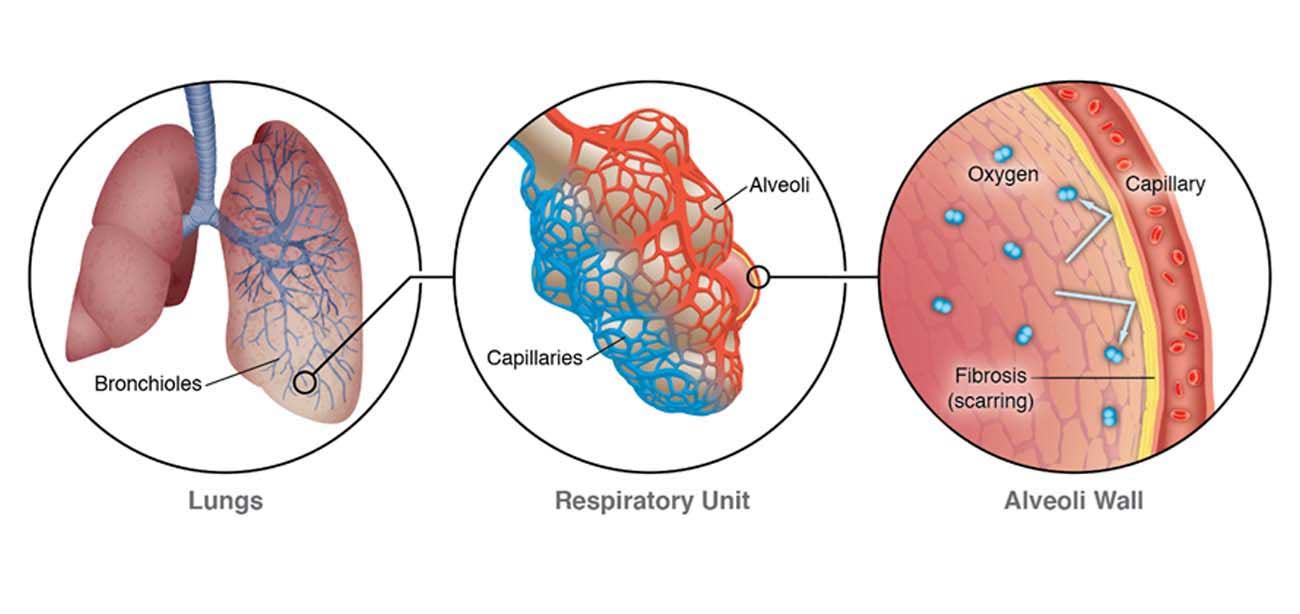Interstitial Lung Disease (ILD) / Lung Fibrosis

Interstitial lung disease (ILD) compromises a large group of disorders, the maximum of which causes gradual scarring of lung tissue. The scarring caused by interstitial lung disease ultimately alters the capability to breathe and get sufficient oxygen into the bloodstream.
ILD may be induced by long-term exposure to dangerous materials, such as asbestos. Autoimmune diseases like rheumatoid arthritis may also lead to interstitial lung disease. In some cases, the actual causes go undetected. Lung scarring is most of the time irreversible. Medications Although medication and treatment slow down the damage of interstitial lung disease, but many people never reacquire full use of their lungs. Some people suffering from interstitial lung disease can opt for a lung transplant as an option.
How is Interstitial lung disease (ILD) Diagnosed?
Recognizing and concluding the cause of interstitial lung disease can be difficult as a considerable number of disorders come into this broad category.
For proper diagnosis of ILD below mentioned tests may be required.
Laboratory tests
Imaging tests
- Computerized tomography (CT) scan - This test can be a crucial and first step in the diagnosis of ILD diseases. CT scans can be especially significant in determining the degree of lung damage caused by interstitial lung disease.
- Echocardiogram - This test can estimate the amount of pressure happening in the right side of the heart.
Pulmonary function tests
- Spirometry - It marks how efficiently oxygen can pass from the lungs into the bloodstream. Read more about it here
- Oximetry - It may be done while resting or performing an activity to monitor the progression and severity of lung disease.
Lung tissue analysis
Usually, pulmonary fibrosis can be diagnosed only by testing a small amount of lung tissue (biopsy) in a laboratory. The tissue sample may be collected in one of these ways like bronchoscopy, bronchoalveolar lavage, surgical biopsy.
ILD Treatment
The lung scarring that results because of interstitial lung disease is irreversible, and treatment will not always be adequate in stopping the progression of the disease. Few treatments may improve symptoms for some time or reduce the disease's development. Others further enhance the quality of life.
As various sorts of scarring disorders have no established or proven remedies, clinical studies may be an alternative to acquiring an experimental treatment.
Medications
Intensive research to recognize treatment possibilities for particular types of interstitial lung disease is ongoing. The doctor may prescribe medications that reduce the progression based on currently available, scientific evidence.
Oxygen therapy
The use of oxygen doesn't stop lung damage, but it can it easier to breathe and exercise, manage complications caused due to low blood oxygen levels and reduce blood pressure in the right side of your heart
Pulmonary rehabilitation
Surgery
Lung transplantation may be a choice of last option for some people with critical interstitial lung disease and haven't shown any cure from other treatments.
Dr. Jeenam Shah is a Pulmonologist in Mumbai. He expertise in Interstitial lung disease (ILD) treatment
 Call For Appointment
Call For Appointment